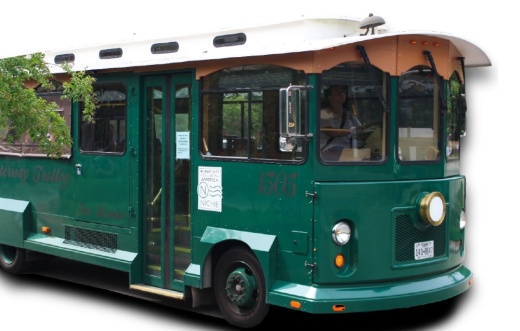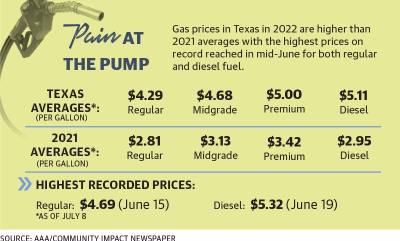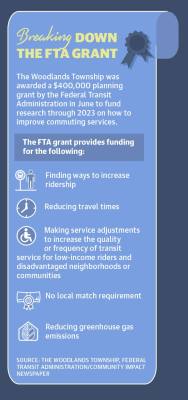The Woodlands has two primary ridership programs: The Woodlands Express Park and Ride, which is a commuting option for residents needing to go to downtown Houston, and The Woodlands Town Center Trolleys, which can transport passengers around The Woodlands Waterway and Town Center.
Chris Nunes, The Woodlands Township’s chief operating officer, said there has been a slow rebound on ridership numbers after the previous downturn caused by the coronavirus pandemic. However, a variety of factors, including fuel and maintenance costs along with an increase in residents working from home, are affecting the park and ride program.
“We are seeing peaks and valleys on a day-to-day basis,” he said. “We are trying to understand those.”
To better understand future needs, the township sought a Federal Transit Administration grant, which was awarded in June for $400,000.
Among the factors township leaders hope to examine are the effects of gas prices and what the future of transit will look like, Nunes said. He said the township will evaluate ways to modify the system.
Along with transit demand, researchers have also noted an uptick in the demands for alternative transportation options, including electric vehicles, which they said have grown in response to environmental concerns and the increasing costs of gas.
Reg Pecen, a professor at Sam Houston State University, said 3 million electric vehicles are expected to be in use around the country by 2025, and the demands for infrastructure will increase with them.
“The International Council on Clean Transportation researchers ... predict that Dallas and Houston may need to add 31%-40% more electric vehicle chargers every year,” Pecen said in an email.
Changes and challenges
One of the primary factors affecting ridership with the township’s transit options has been the shift to working from home because of the coronavirus pandemic, Nunes said.
According to a report from the township, ridership on The Woodlands Express had been at 44,780 in February 2020. Within two months, it had dropped to 2,029 riders.
Information from a June 22 board of directors meeting indicates in May, there were 21,211 riders on The Woodlands Express. This follows an upward trend since ridership dropped below 20,000 in March 2020.
The $400,000 FTA grant is funded by the American Rescue Plan Act. Ruthanne Haut, The Woodlands Township’s director of transportation, said the money is allowing the township to make a deep dive into when and why people are using the commuting services and how the system can be improved. Haut said the planning efforts with the grant will be concluded in early 2023.
For The Woodlands Express Park and Ride program, Nunes said he believes rising gas costs could be causing a slight increase in the number of riders with an average daily increase of around 30 passengers for a total of 670 daily passengers over the past several months.
Information from AAA, which tracks state and national gas prices, indicates that as of June 30, gas costs were at $4.48 per gallon. The record high prices for regular unleaded gas and diesel were reached on June 15 and June 19 respectively at $4.69 and $5.32.
AAA indicates the average price for unleaded gas on the same date in 2021 was $2.79 per gallon.
“Are we going to see a skyrocketing number of riders because of gas prices? We are not seeing that yet because that specific workforce has the ability to say, ‘Hey, I am going to work from home for three days,’” Nunes said.
Haut said this is where federal funding from the Coronavirus Aid, Relief and Economic Security Act and ARPA funds were helpful for the township, as they sustained the revenue typically brought in from fare fees.
Information for The Woodlands 2022 budget states there was a total of $1.9 million in CARES Act funding, and $1.8 million in bus fares for revenue sources. In 2021, the township budgeted $2.6 million to be generated through bus fares, according to budget documents.
Nunes added the maintenance and fuel costs are factored into The Woodlands’ budget, and contracts with bus provider First Class Transportation are locked in for two years through 2024, costing the township $617,651 with the contract expiring in April.
Additional challenges come in the form of maintenance and personnel costs. Documentation from The Woodlands Township indicates that in a March report, First Class Transportation had to increase the average pay of drivers by around 28% in 2021. Without it, the services would have “been negatively impacted in a significant way” because of the coronavirus pandemic, according to township information.
Other maintenance costs, such as mechanic costs and service line wages, have increased by 8% and 15%, respectively.
Planning ahead for services
The FTA grant is anticipated to fund research through 2023, and Haut said it will allow the township to adjust and modify the system further with additional data following the pandemic.
To understand how to best change the park and ride services for area residents, Haut said a community survey was conducted in June. Once the results are processed and analyzed, Haut said they will be presented to the board of directors for further discussion in 2023.
The township has discussed expanding the trolley services as well. During an April presentation to The Woodlands board of directors, Haut said discussions were underway to look at expanding the trolley services to the various village centers.
Haut noted there has been an increase in riders who have been utilizing the township’s trolleys throughout 2022. Information provided from the June 22 board meeting shows that in May 2022, there were 11,125 passengers on the trolley system, a slight decrease compared to the previous numbers in March but higher than March 2020, when the coronavirus pandemic started. Prior to the pandemic, the highest ridership in 2020 had been in February, with 10,037 riders. The most recent data shows May 2022 had around an 11% increase since that time.
Information from The Woodlands 2022 January to December fiscal year budget states the total expenditures for maintaining its transportation fund are around $6.4 million, down around $2.9 million compared to 2021.
The township’s budget document indicates around 95% of revenue for the transportation fund comes from grants and passenger bus fares.
The total cost for the trolleys themselves, including personnel costs, was budgeted at around $949,000 for FY 2022, from January to December.
Electric vehicle demands increasing
Regional experts say the demand for electric vehicles across the state has been seeing an increase over the past year.
Information from the Texas Department of Motor Vehicles shows there was a 52% increase in alternative fuel vehicle ownership over the past five fiscal years. The department reports there were a total of 322,603 vehicles registered in the state in FY 2021 compared to the 242,541 in the previous year.
However, the DMV notes alternative fueled vehicles only make up around 1% of vehicle ownership in Texas. There was also a 3% increase in electric vehicle registration between 2020 and 2021 to make up 19% of the total alternative fueled vehicles in the state, according to the DMV’s most recent report from November 2021. A DMV official said 2022 data is not available at this time.
Gavin Dillingham, vice president of the The Woodlands-based Houston Advanced Research Center, which provides independent analysis on energy, air and water issues, said research indicates that despite current gas prices, driving patterns have not changed significantly.
“I think it takes a while for people to change those kinds of habits,” he said.
Dillingham noted there has been an increased demand for electric vehicles. In The Woodlands, there are a total of 17 electric vehicle charging stations, according to information from energy provider Reliant. Information from the Texas Department of Licensing and Registration indicates a total of 10 stations around The Woodlands Mall were registered and developed in late 2019.
There has also been an investment in electric vehicle systems at the federal level. In February, the U.S. Department of Transportation announced a bipartisan bill that includes $7.5 billion to build out around 500,000 electric vehicle charging stations across the country.
Dillingham said the increasing number of electric vehicles raises concerns about Texas’s energy grid because of the increased demands from charging stations.
“Due to the limited number of electric vehicles, they are being sent to the places where there is a higher demand for them,” Dillingham said.







